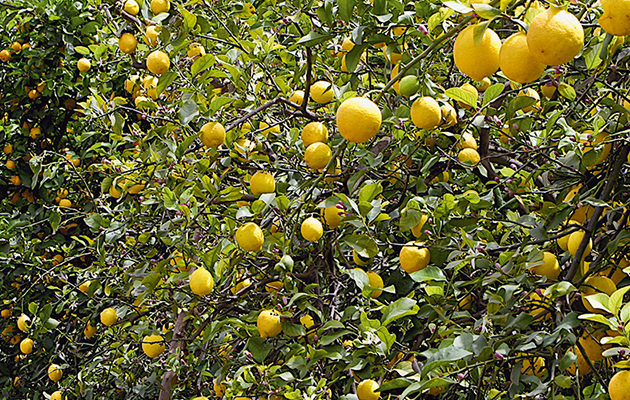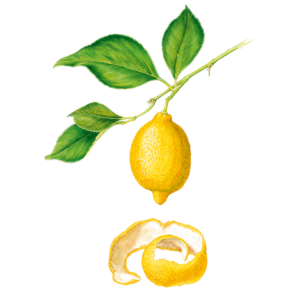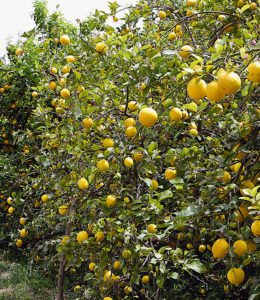
Find out more about the Lemon plant of our Aromatherapy Herbarium blog series.

LEMON
Citrus limon
DESCRIPTION

The lemon tree (Citrus limon or limonum) is a shrub with persistent and glossy dark green leaves, also called “English lemon tree”, which belongs to the large Rutaceae or citrus family
ADVICE
Extremely powerful and phototoxic, the essence of Citrus limonum must never be applied pure on the skin or before exposure to the sun. The perfumes that contain it can leave dark stains that are hard to remove in those cases. Hepato-renal tonic, care should be taken concerning drug interactions when using for more than a few days (contraceptive pill, anticoagulants, chemotherapy, etc.). For cooking, one or two drops of essential oil are enough to perfume a dish for five to six persons.
DO NOT USE IN
– pregnant or breast-feeding women,
– children under the age of three years,
– persons allergic to one of the components (geraniol, linalool, limonene),
– persons with asthma without the advice of an allergologist before the first use.
RECIPE
Air cleansing
Diffuse 20 drops over an hour using a diffuser (soft heat or cold spray).
Difficult digestion
Pour 2 drops of lemon essence (or 1 drop of lemon essence and 1 drop of essential oil of peppermint) on a neutral tablet or small sugar lump. Allow to melt in the mouth after meals.
Immunity
Place 2 drops of lemon essence in a teaspoon of olive oil or honey, on a neutral tablet or small sugar lump every morning for fifteen days.
Travel sickness, nausea
Take 1 drop of lemon essence on a neutral tablet, a sugar lump or a spoonful of honey before leaving. Repeat during the trip, if necessary (six times per day maximum).
Bad breath, disinfection of the mouth
Pour 1 to 2 drops of pure lemon essence (or essential oil of tea tree) on the toothpaste.

Its genus includes one hundred and sixty species. Its leaves which contain translucent glands, release a strong fragrance when crumpled. Its fruits are present on the tree throughout the year, with peaks in March-April and October-December. Citrus limon is derived from the natural hybridisation between citron (Citrus medica var. vulgaris), lime (Citrus limetta) and grapefruit (Citrus paradisii). Showy to the eyes and astringent to the palate, lemons have a temperament that leaves no one indifferent. Its marked personality can be annoying: the press gives the “lemon award” to a particularly awkward politician. An old popular Greek song says: “Say, do not smell so strong, my little scented lemon, or I will get mad!” It is a native of ancient Media, between the Tigris and the Caspian sea. Virgil, in The Eclogues, considered it capable of “softening the stinking breath of the Medes and “soothing the pulse of trembling elders”. Crusaders called lemons the “Median apple” and it was taken on board as an anti-scurvy treatment by Arab navigators two centuries before Christopher Columbus crossed the Atlantic in his caravels.
CULTIVATION AND PRODUCTION
Lemon trees, cultivated in the Mediterranean basin, especially in Spain, main world exporter, and in subtropical regions, like slightly acid and well drained soils. In France, it grows in the ground in the region of Menton and Corsica, but the market production is insignificant.
FRAGRANCE
The smell of lemon is typical, fresh, fruity and tangy, characteristic of the fresh lemon pericarp.
EXTRACTION AND YIELD
Lemons are picked before fully ripe and, like for all citrus, their essence is obtained by cold extraction from the rind. In the past they were pressed over a sponge. Its yield is of 4%, i.e. four kilograms of essence per hundred kilograms of fruit rind.
CHEMICAL FORMULA
The active ingredients of the essence of Citrus limon are principally monoterpenes (limonene, gamma-terpinene, limonene), terpenic aldehydes (geranial, neral), monoterpenols (geraniol), along with coumarin and furocoumarin.
MAIN INDICATIONS
For many years it was only used as an antidote and remedy for respiratory ailments, the essence of Citrus limonum rind is recommended for its tonic, hepatic and anti-nausea properties. This essence is excellent for persons with a pulmonary overload (manifested by an asthmatiform cough), itself due to a functional hepatic failure. Its pleasant odour cleanses the air. It helps fighting against heavy legs, water retention and excess weight, when the symptoms are of hepatic origin.


Leave a Comment